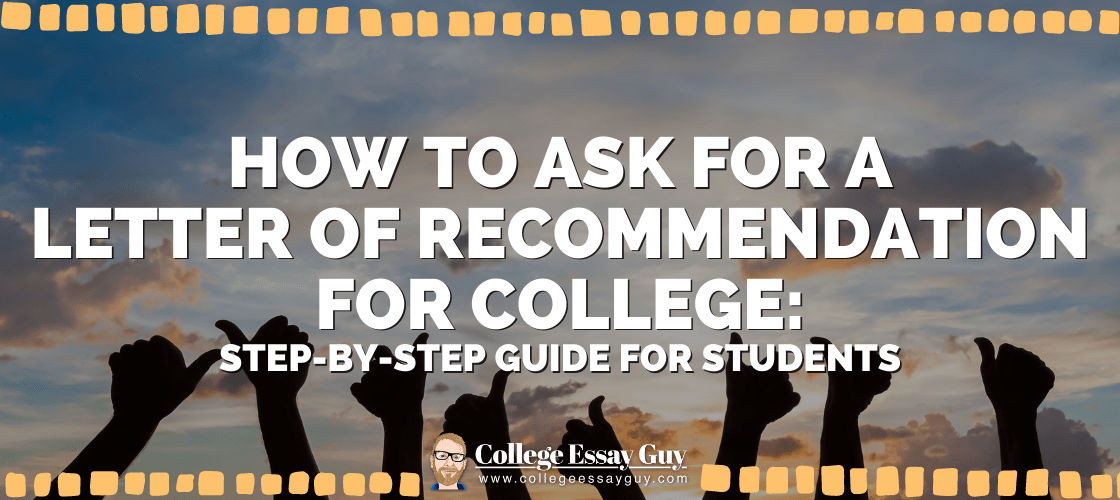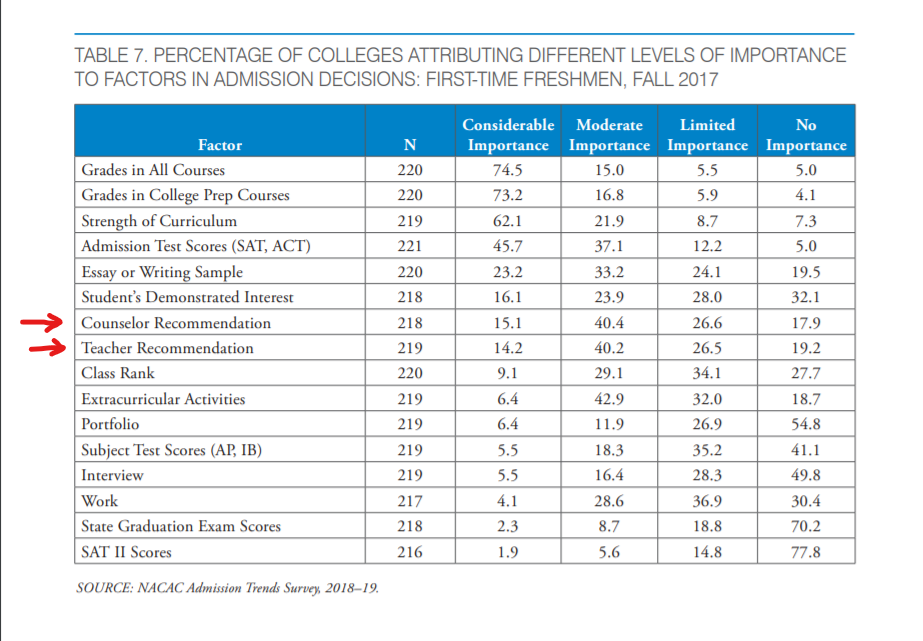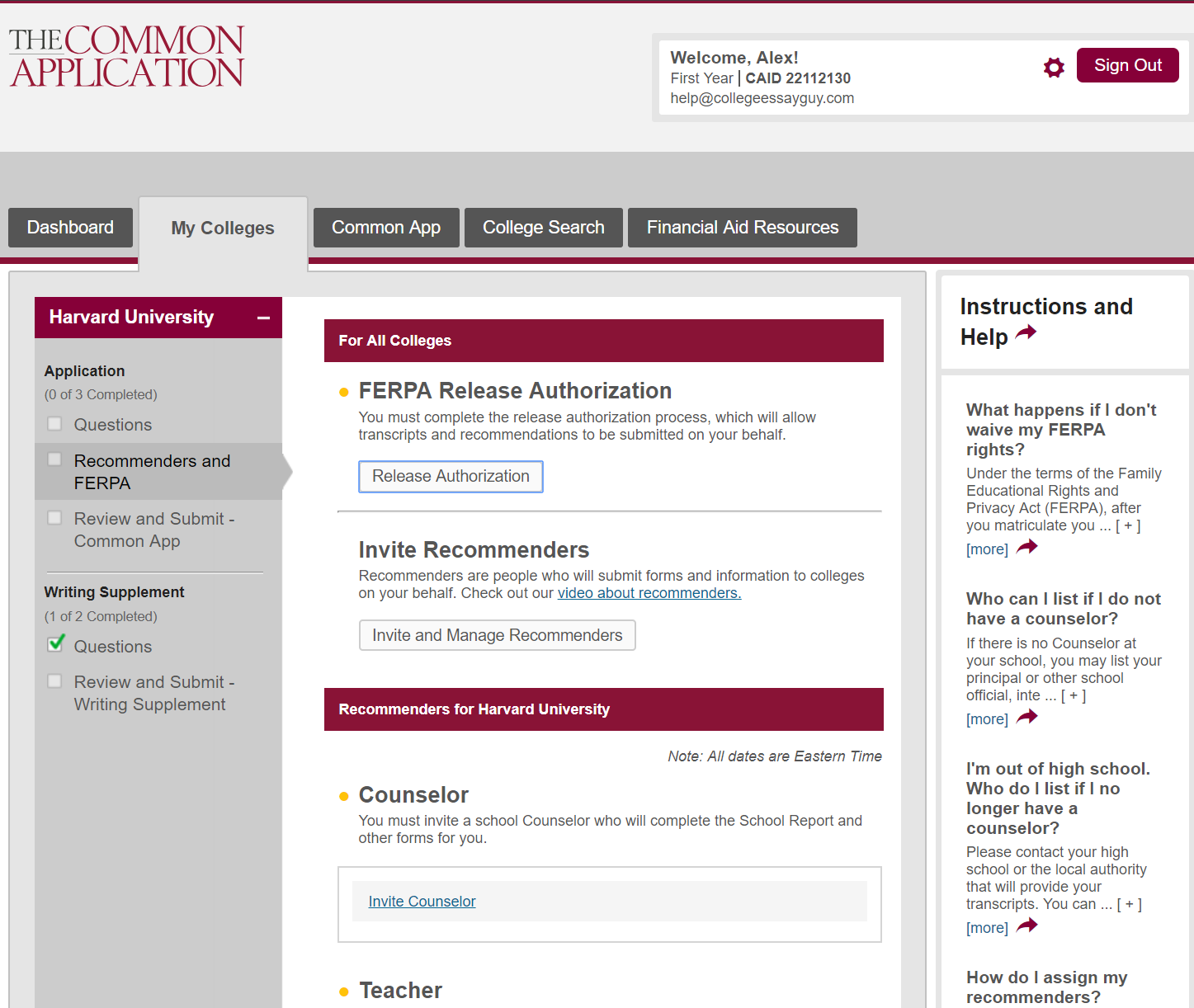Are you a teacher looking to write a letter of recommendation for your students?
Are you a counselor looking to learn how to write a great recommendation letter for your students?
Written by Alexis Allison, College Essay Guy Team
Cue the Hallelujah chorus: the letter of recommendation is the one part of the application that students don’t have to write.
But wait! Before you crank up Pharrell Williams, know this: You still have to know how to ask for a letter of recommendation.
There’s actually a strategy to getting a creme-de-la-creme letter of recommendation for college—kind of like there’s a strategy to getting your parents to un-ground you, or your teacher to throw out that homework assignment over spring break.
In the spirit of this topic, we’ve gathered advice from a number of experts, including:
Chris Reeves, school counselor and member of the NACAC board of directors
Trevor Rusert, director of college counseling at Chadwick International in South Korea
Michelle Rasich, director of college counseling at Rowland Hall
Kati Sweaney, senior assistant dean of admission at Reed College
Sara Urquidez, executive director of Academic Success Program, a nonprofit that promotes a college-going culture in Dallas/Fort Worth high schools
Martin Walsh, school counselor and former assistant dean of admission at Stanford
Michelle McAnaney, educational consultant and founder of The College Spy
And I’m Alexis, a high school English teacher-turned college counselor-turned journalist. Ethan (the College Essay Guy) and I serve as your synthesizers and storytellers in this guide, which we’ve chunked into a few steps:
TABLE OF CONTENTS
- Getting Started: Preparing to Ask for a Letter of Recommendation for College
- How to Choose the Right Teachers for a Letter of Recommendation
- How to Ask for a Letter of Recommendation for College
- When to Ask for a Letter of Recommendation
- The Follow-Up Email: What to Send Your Teacher After Asking for a Letter of Recommendation
Getting Started: Preparing to Ask for a Letter of Recommendation for College
So, you’ve got to get another human’s stamp of approval.
Why bother? Because some colleges consider letters of rec pretty darn important — above class rank, extracurricular activities and, at least when it comes to the counselor recommendation, demonstrated interest (dun dun dun!). Check out the results of the 2017 NACAC “State of College Admission” survey:
Our buddy Chris Reeves, a member of NACAC’s board of directors, has another way to read this table:
“If you consider ‘considerable importance’ AND ‘moderate importance,’ the teacher letter is also more important than demonstrated interest. The counselor rec even ranks above the essay.”
Basically, if it comes down to you and another candidate—all else being equal—your letters of recommendation can get you in or keep you out.
And, according to a presentation co-led by our friend Sara Urquidez at a 2017 AP conference, rec letters can also help decide who gets scholarships and who gets into honors programs. All told, they’re a big deal.
In this student guide, we focus on how to approach your teachers for a rec letter. Your school counselor may also write you one—ask to find out.
Either way, a word to the wise: Make sure your counselor knows who you are.
According to Sara, your counselor is the person that admissions representatives will call if they have questions about your application. She writes, “It’s important to keep them up to date and in the know.” So pop in every now and again and say hi. Make a copy of this counselor questionnaire, fill it out and either email it to them or print it and hand-deliver it. They will love you for it.
Now, the teacher letter.
How do I get started?
First things first. Find out which schools on your list require a teacher letter of recommendation for college (or two! or three!), and which deadlines you’re pursuing: Early Action, Early Decision, Regular—some will be earlier than others. You’ll eventually give this curated list to your recommenders. A note: They’ll typically only write one universal letter to be sent to all the schools on your list, not individually tailored letters for each school.
Now you can start asking around.
How to Choose the Right Teachers for a Letter of Recommendation
In an ideal world, you’d ask someone who teaches a core subject (English, math, science, social studies), who taught you recently (junior year is prime) and who knows you well and actually likes you. If you can’t find one person who fits all of those things, this is what you should prioritize:
Someone who knows you well and actually likes you
Someone who taught you recently
Someone who teaches a core subject*
*Important note: Some colleges require or recommend that students submit recommendations from teachers in certain subject areas. Be sure you double check that.
Overall, think of it this way—it won’t help the college get to know you if your recommender doesn’t know you.
What if I need two (or three!) teachers?
Pick teachers who can highlight separate strengths. For example, your band teacher knows things about you that your English teacher doesn’t, and vice versa. Having said this, I wouldn’t recommend picking teachers who teach electives for your main letter of rec (with exceptions like your music teacher for music school and art teacher for art school) as colleges are most interested in how well you’re doing and will do in academic subjects.
What if I don’t know any of my teachers?
It’s better to cultivate a relationship with a teacher before you need something. But if you find yourself in a bind and haven’t gotten to know any of your teachers, it’s not too late to start. One of the best things you can do is pop in during your teacher’s office hours and, if they aren’t busy, ask questions. About class, work, life. Get to know them too.
Finally, to help your teachers get to know YOU better, click here. Make your own copy of the document, fill it out and either email it to them OR print it and deliver in person.
(For good measure, here’s that questionnaire for you to fill out and give your counselor, too!)
As you think about which teachers to ask, here’s an exercise, adapted from our colleague Stacey Picket Cunitz, that can help strengthen both their eventual recommendations and your understanding of what they’ll be doing.
Step 1: Grab paper and pencil, or open a new doc for notes…
Step 2: And then open this up.
That’s the Common App’s Teacher Recommendation Form.
Step 3: Take some time and imagine how your teacher/s might fill it out for you.
With the “What are the first words that come to mind...?” identify and jot down both what you think comes to your teacher/s’ minds, and the words you want to come to mind (are there differences?).
With the “ratings” section, what are your strengths? What could you improve on?
What are concrete, actionable steps you could take to improve? And what are actions you could take, with integrity, to shift the words that come to their minds?
Note that this exercise is useful to work through regardless of how much time you have before your letters or rec are due, but if you want to be able to act on that final bullet point, you’ll probably want a few months to be able to shift your actions appropriately.
Recommendation Letter Tips
Actually ask.
Don’t just add your teacher’s name to your Common App. When I was a senior in high school, a guy went around telling people we were going to prom together without asking me. Yeah, no. This is just as bad. I told students who did that “no” on principle.
Ask in advance.
I mean way in advance—like, end-of-junior-year advance, if possible. Three weeks before the application deadline should be your minimum, and even that’s pushing it. Martin Walsh, former assistant dean of admission at Stanford, recommends a 90-day heads’ up. A rule of thumb: The more time you give your teachers, the more they will love you and the better your letter will turn out.
Ask in person.
An email ask should be a last resort. Be bold, young grasshopper! If you or they have moved, and asking in person isn’t possible, opt for the phone call first, email second, text never.
Don’t group-ask the teacher.
Make sure you ask one-on-one. Once I had two students ask me for a letter of rec at the same time, so I felt obligated to tell them both yes—how awkward would it have been if I’d told one yes and one no?
(Pro tip: This is not how you want your teachers to feel as they’re writing your letter.)
Handle the print submissions.
While this isn’t the norm, some schools still want you to snail mail your letters of rec. If that’s the case, it’s your responsibility to provide the teacher with a stamped envelope addressed to the admissions office of the relevant college.
Know your teachers (and school counselors on behalf of your teachers) may have their own process—and follow it.
For example, they may have their own questionnaire for you to fill out (and they might tell you to fill it out immediately). Whatever it is, follow through and respect their timeline.
Prepare to return in kind.
The more you ask of a teacher, the more you should plan to give them in return. These rec letters—especially the good ones—can take three hours to write. And the thing is, teachers don’t have to write these letters. They don’t get paid for them. They do them out of kindness and care on top of their other work. At the very least, plan to write thank-you notes.
Need to prepare for the college interview?
Click here for the ultimate guide
When to Ask for a Letter of Recommendation
As mentioned above, ideally you’d ask for letters of recommendation at the end of your junior year (and you would, after doing the exercise above, spend a few months before the end of your junior year establishing a stronger relationship with them).
To keep it simple, the sooner your application is due, the sooner you need to ask.
But be sure to ask at an appropriate time. You know how you wait until your parents are in a good mood before you ask them for something? Do that with this.
That means: Don’t ask your teachers during lunch. (They’re humans. They eat.)
Not right before class. (You’ll interrupt their class-prepping mojo.)
Not in the middle of class (just, no).
Two better options for when to ask for a letter of recommendation:
Schedule a brief meeting with your teacher in advance.
Shoot them an email asking if they have five minutes to chat with you about college sometime in the next week, then set up a time and don’t be late. The thoughtfulness will add another jewel to your crown in Letter of Recommendation heaven.
Wait until all the students have left the classroom at the end of the day, and cautiously approach the teacher, as you would a wild animal.
Here’s a sample dialogue that works:
You: “Ms. Smith, do you have five minutes to talk?” (This is key. You’re inviting her into the conversation, while also giving her a quick out if she needs one.)
Ms. Smith: “Sure, Johnny. What’s up?”
You: “Well, I’m in the throes of applying to college. I’ve got some deadlines in about three months, so I’m trying to be proactive and organized before all hell breaks loose. (She’ll love you for thinking ahead.) That’s why I’m here. Of all the teachers I’ve had, I think you know me the best, and I’m wondering: Would you be willing and able to write me a strong letter of recommendation?” (The word “strong” gives teachers a polite out if they feel like they don’t know you well enough or don’t have time to take on your letter.)
Ms. Smith: “Oh Johnny, I thought you’d never ask.” (She probably won’t say this, but you can dream.)
You: “Really? That would be wonderful/epic/lit. Tonight I’ll email you all the relevant information—my resume, my list of colleges and their deadlines, and some bullet points with stuff I’ve done in class. (See below for more info on this follow-up email.) Is there anything else you’d like from me?
Ms. Smith: “Wow, no, I think that about covers it. Thanks, Johnny.”
You: “Thank you, Ms. Smith!”
(Turns away, nearing the door. Stops as if remembering something, turns back toward Ms. Smith with a winning smile.)
You: “Oh, Ms. Smith! I almost forgot to ask … what’s your favorite coffee shop?”
Ms. Smith: “Oh heavens. Starbucks, I think. Why?”
You: “No reason! Have a great day!”
(Skips out the door and immediately jots “Starbucks—Ms. Smith” into notes app, because you’ll be getting her a Starbucks gift card and thank-you note when all this is over.)
And that’s how it’s done.
The Follow-Up Email: What to Send Your Teacher After Asking for a Letter of Recommendation
Now you know how to ask for a letter of recommendation.
But you aren’t finished yet.
Once you’ve had That Conversation, you need to do one more thing the very same day: Write your teacher a follow-up email.
A teacher’s brain is like a very smart bowl of spaghetti: If you don’t put your conversation down in writing, it might get lost in a thick vat of garlic and marinara.
For this follow-up email, you’ll need these things:
A heart of gratitude. Seriously.
This completed questionnaire about yourself. Be detailed. Your teacher will love you for it.
An up-to-date, professional resume. Don’t have a resume? Read this blog post on writing a killer one (or if you need a template).
A list of the colleges that will need your teacher’s letter of recommendation, and each college’s application deadline. (This part is in the questionnaire!)
A brief paragraph about what you hope to study, and any relevant life dreams, etc. (This part is also in the questionnaire!)
Here’s a good example:
SUBJECT: Letter of recommendation follow-up (Deadline: Nov. 15)
BODY:
Dear Ms. Smith,
I hope this email finds you well.
First of all, thank you. It means a lot that you’re writing me a letter. To make the process smoother, I’ve included my current resume, as well as the attached questionnaire to remind you of all my amazing qualities (hehe). Otherwise, here’s what you need to know in brief:
I’m applying to the University of Texas, Stanford and USC.
All three schools have a deadline of Nov. 15, so you’ve got plenty of time.
I hope to study mechanical engineering with a minor in philosophy regardless of where I end up, but Stanford is my No. 1 because I’d get to take classes at the d.school to supplement my studies.
My dream job: NASA.
That’s it! Again, thank you, thank you for doing this for me. Please let me know if there’s anything else you need, or if you have any follow-up questions. And, if it’s okay with you, I’ll probably send a check-in email maybe a week or two before the deadline to make sure all is well.
In the meantime, I hope you have a beautiful day!
Sincerely,
Johnny D.
To quote Bob from Stranger Things season 2: “Easy-peasy.”
A final important tip: After you’ve requested a letter of recommendation, at some point in the application process you’ll need to waive your FERPA rights.
What’s FERPA?
It’s a law that, among other things, protects your rights as a student to view your own education records. If you waive those rights on the app, it means you won’t be able to see what your teachers write about you, which basically frees them up to write whatever they like.
But what if you want to see how great they think you are?
Have them sign your yearbook instead. If colleges see that you have not waived your FERPA rights, they’ll assume you’ve read your letter of recommendation for college and may not trust its objectivity. So we recommend waiving your FERPA rights.
This is what you should see if you’re using the Common App:
That’s a wrap.
Congratulations—and phew! You’ve made it to the end of our guide.
Before you fall over from the mental food baby we’ve given you, we’d love to hear from you. Is there something we’ve overlooked? A burning question we haven’t answered? Maybe you’ve your own suave asking strategy you’d like to share. Email us at help@collegeessayguy.com.
Finally, if you’re feeling inspired and want to learn more about all things college-admissions, we’ve got you covered—find your next free guide here.












